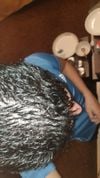community 1 month already into Finasteride 0.5mg, 2 months (nizoral, vitamin b12, biotin and rosemary oil and dermaroller once or sometimes twice a week 0.5). Let's see how it progresses after each month. Wish me luck. Please advise me something if I need to consider something else.
The user has been using finasteride 0.5mg for one month, along with Nizoral, vitamin B12, biotin, rosemary oil, and a dermaroller for two months. They seek advice on additional treatments and hope for progress.
